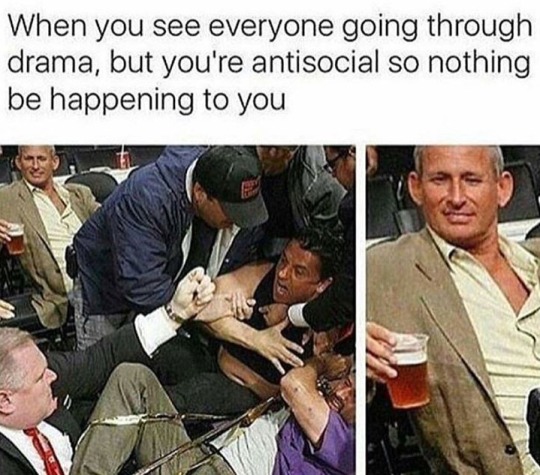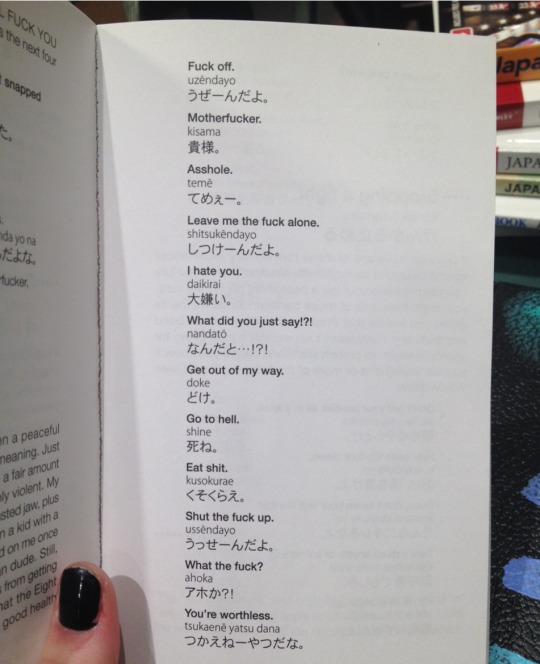Text
today my friend told me that the only people who abide by social distancing are those who didn’t peak in high school. and you know what? points were made.
3K notes
·
View notes
Text
Raise your hand if you grew up using literature and school as a form of escapism from the effects that generational traumas had on your life, resulting in an emotional attachment to academia and you never really living your teen years out to the fullest because of this.
4K notes
·
View notes
Text
having a family youtube channel should automatically flag you to CPS
28K notes
·
View notes
Text
some of you haven’t gotten a book taken away in class because you just couldn’t stop reading and it SHOWS
53K notes
·
View notes
Video
the goodest little bean
Tiny unit
23K notes
·
View notes
Text
sometimes making tea is less about drinking it and more ab it keeping you company
227K notes
·
View notes
Text
I wrote another essay about homoeroticism - this one’s on The Great Gatsby
I’m not sure if anyone cares about this because I can’t envision The Great Gatsby fandom being as desperate for such content as the Lord of the Flies one, but I hope that anyone who can be bothered to read enjoys it! Thank you for all the positive feedback, and check out The Great Gatsby if you haven’t already :))
-
Although on a purely superficial level, The Great Gatsby by F. Scott Fitzgerald is a blatantly obvious examination of the American Dream, the shallowness of the upper classes, and the underlying corruption and hedonism perpetually underpinning affluent 1920s society, an alternative and previously analysed reading of the novel lies partially below the surface, yet evident enough to possess a significant critical following. This theme is, undeniably, homoeroticism, perhaps hidden and coded implicitly within the text to disguise still criminalised components, but crucially important, particularly from the perspective of understanding Nick Carraway’s narration, and the nature of his conspicuous bias towards Jay Gatsby which skews his reliability significantly when recognised by the reader. Despite his proclamation at the end of Chapter 3 stating that his ‘cardinal virtue’ is that he is ‘one of the few honest people that I have (he has) ever known,’ from the beginning of his subjective account of events, his descriptions of others suggest that his statement of being ‘inclined to reserve all judgments’ on the first page is contradicted by his profiling of others, both physically and in regards to their personalities. This is almost relentless and lacking in exclusive scrutiny, offering an insight which appears to be detached, consequently lulling the reader into believing Carraway’s points surrounding his allegedly objectively accurate retelling of the summer – however, even before this, Nick admits the one major and vital fault of his perception, which is Gatsby. Even as it becomes clear to all parties that Gatsby is, in many ways, extremely morally flawed (he is an illegal bootlegger by profession, he is obsessive and somewhat manipulative of Daisy, he facilitates and encourages her infidelity, he is fixated on materialistic wealth, and he frequently lacks consideration for others if it ensures his ability to pursue his ambitions), to Nick, he represents ‘everything for which I have (he has) unaffected scorn.’ For our narrator, this character is symbolic of hope, success, and romance, and when the inherently decaying American Dream inevitably collapses, as exhibited by Gatsby’s murder towards the end of the plot, Nick’s portrayal in hindsight is not altered by Jay’s faults, but by his positive attributes. Prior to a genuine introduction with a scene involving the two, Nick writes that ‘there was something gorgeous about him, some heightened sensitivity to the promises of life,’ and this permeates all. Regardless of whether or not the assumption is made that Nick is describing merely Gatsby’s metaphorical and figurative role in the story, it is clear since the book commences that his perception of the titular man could, in many ways, be interpreted as one of intense passion and attraction, far beyond the platonic relationships he has with other individuals, and later extending to him conveying the physical beauty that is highly appealing to him concerning Gatsby. Even Nick’s love interest, Jordan Baker, is not exempt from his reproval, and is, in fact, articulated to be ‘dishonest,’ with negative and emotionally lacklustre depictions that prompt questions surrounding the easily debatable strength and plausibility of his romantic interest in her.
One major scene that is consistently referenced and considered to be majorly indicative of Nick’s sexual orientation occurs very early on into the novel towards the end of Chapter 2 – it is incredibly subtle and often overlooked especially by first time readers due to the cryptic nature of its language and the seemingly comparatively unimportant series of events that ensue. In fact, one could argue that there is generally very little need to include such a scene, and thus contemplate why Fitzgerald decides to do so regardless. Usually, from a literary perspective, for something to be rendered worthy of inclusion, it must serve to develop plot, characters, or a specific setting and atmosphere in adherence to overriding themes, and the focus upon Nick, still as a relatively submissive bystander who is simultaneously immersed enough to offer a narrative insight, indicates that the only feasible value available must be revolving around his character development. The plot is not advanced as the occurrences are entirely overlooked and left with no true contextual repercussions, and the setting at this point is not focal nor enhanced with adjectives and figurative language that would suggest a distinct relationship between the whole surrounding set of dates and the West and East Egg regions which become recurring areas with allocated symbolic values, and ergo this being the reason.
Here, most notably, Fitzgerald must be attempting to prove or infer something about Nick Carraway, which I believe, largely due to substantial implicit evidence within the text, to be referring primarily to one of the many factors culminating to formulate his broad unreliability; a sense of sexual ambiguity, and the blatantly apparent evasion and withholding of information, but still without avoidance of the subject in its entirety, implied by the use of ellipses to signify both time passing and suppressed detailing of the true events. In regards to homoerotic subtext, this component potentially begins with the description of Mr McKee, the character that Nick purportedly has an affair with, as ‘pale’ and ‘feminine’ upon first encounter, two adjectives directly referencing a lack of masculinity and, in turn, the stereotype of effeminate fragility typically associated with homosexual men. His involvement in the ‘’artistic game’’ has, again, subtextual connotations with homosexual and, possibly to a lesser extent, bisexual males, as the following of artistic pursuits was perceived to be more traditionally feminine, and perhaps later adhering to forms of aestheticism and the almost synonymously analogous and prominent figure of Oscar Wilde, who was and still is renowned for both aesthetic and philosophical reasons and his historical persecution for gross indecency. With this evocation of Mr McKee in mind, suggesting his lack of conformity to societal norms through sexual deviation, at around 10 o’clock, Nick wipes ‘from his cheek the spot of dried lather’ that had ‘been bothering him’ over the course of the evening, a remarkably intimate gesture, and an otherwise broadly inexplicable fixation within the context of this man’s likely homosexuality. Later, Mr McKee proceeds to leave the room, and Nick follows without hesitation, implying almost a non-verbal communication which results in the scene in the elevator, laden with highly euphemistic linguistic choices. Mr McKee uses the command ‘Come to lunch with me some day’ in a manner reminiscent of an individual asking another out in a cryptically heteronormative tone, coupled with the pair ‘groaning’ down the elevator, a verb synonymous with overtly sexual onomatopoeia. Nick agrees, saying he’ll ‘be glad to,’ perhaps an admission to both the reader and Mr McKee that the feeling implied by the latter is to some extent reciprocated, indicating that Nick himself is not heterosexual. Just before this, a ‘lever’ is incorporated which Mr McKee is shunned for allegedly touching, seemingly a clear phallic symbol due to its vague resemblance of a penis, reinforcing the layers of homoerotism and the ambiance leading up to a romantic or sexual encounter involving the two characters that have distanced themselves from the overwhelming group, potentially a metaphor for the exclusion and separation of the LGBT community necessary for protection in an intolerant outside world. This scenario, abruptly led and finished with a series of ellipses, concludes with Nick, our narrator, ‘standing beside his (Mr McKee’s) bed,’ as Mr McKee is ‘sitting up between the sheets, clad in his underwear, with a great portfolio in his hands.’ Nick ends up at a train station waiting for the ‘four o’ clock train,’ leaving what truly happened with Mr McKee largely a mystery, but the aforementioned’s nakedness and the presence of a bed, as well as the feasibly metaphorical ‘portfolio,’ all indicate that a sexual encounter took place between the two, as little other explanation is given for the passing of six hours shown to have been almost exclusively in each other’s company. As always, Nick’s bystander-esque lack of involvement even in situations centring predominantly around him leaves room for plausible deniability; maybe the scene is exclusively a reflection on Mr McKee’s sexual orientation and subsequent moral perversion, or, more significantly, Nick’s willingness to go along with anything without reaffirming his own beliefs or desires, painting him as a fully submissive and detached narrator. Regardless, this relatively brief passage is undeniably dense in highly homoerotic content, portraying Nick largely as a closeted homosexual (or simply a heterosexual man who had a short and sexually intimate relationship with someone of the same gender, but this is far more difficult to believe in the surrounding circumstances), with this conveying an image of both and unreliable narrator and one who could conceivably be infatuated with the protagonist (Gatsby).
Nick’s relationship with Gatsby is vital throughout the novel, in both plot and in how Nick chooses and is capable of narrating a story focusing mainly upon the latter – one which is, evidently, biased invariably in his favour, even amidst ethical decay and his eventual death, which appears to influence Nick far more profoundly than the others, all of whom decide to abandon Gatsby by not attending his funeral as the book comes to a close. Despite the brevity of the period in which they interact and become extremely close, Nick organises the majority of Gatsby’s funeral, as previously mentioned, is loyal to him throughout with consistently lacking personal gain, offers him advice and support, and after his death, decides to write a memoir framing him in an overwhelmingly positive and complimentary manner, one which is likely far from the reality of his existence and impact upon others. Physically, Nick is evidently immensely attracted to Gatsby; when his love interest is given an unenthusiastic paragraph with phrases including ‘I enjoyed looking at her’ and emphasis upon her more masculine features and attributes (‘small-breasted,’ and ‘like a young cadet’), Gatsby’s intrigue is delivered impactfully, with several sentences dedicated to his smile alone, which is stated to have had ‘a quality of eternal reassurance in it.’ The last interaction between Nick and Jay consists of a long and emotional confession delivered by the latter, involving the true history of his origins, a story which he escapes explicitly mentioning, denies, and formulates lies to detract from right up until the end of the text, signifying that the bond established between both men may even be greater than the romanticised superficiality of Gatsby’s infatuation and fixation with Daisy. Whether or not Gatsby ever truly loved her is easy to speculate, with the most common theory being that he was simply enamoured with an idea that he had attached to her for his own sanity and aspirations – in a more uncommon homosexual reading of Gatsby, perhaps he ascribes an idea of the American Dream, wealth, success, and integration with the ‘old-money’ elite to her as a means of distracting from his real sexual and romantic interests, although this is admittedly far from substantiated. Nick finishes the dialogue with allegedly the ‘only compliment I (he) ever gave him,’ which is stated as written: ‘’They’re a rotten crowd,’ I shouted across the lawn. ‘You’re worth the whole damn bunch put together.’ Gatsby responds to this with his ‘radiant and understanding smile,’ one glimpse of a world in which Nick’s love for him may have not been so apparently unrequited, and potentially a revelation into the growing mutuality of what could have been a romance in different circumstances. Nick’s description of Gatsby and his actions is close to being perpetually complimentary, and usually resumes to this position quickly when it falters, so this reinforces his unreliability and a degree of obliviousness to his own feelings and emotions, whilst simultaneously demonstrating to the reader what is already salient at most levels of observance – that Nick views Gatsby and his worth above all others, including his friend of many years, Tom, his cousin, Daisy, and his romantic interest, Jordan. This level of attraction and love is usually reserved to forms outside of what is known to be platonic, suggesting that what Nick feels for Gatsby also transcends friendship. In Tom and Nick’s last interaction, Tom states that Gatsby ‘threw dust into your (Nick’s) eyes just like he did in Daisy’s,’ conveying that he might himself have deemed Nick and Gatsby’s relationship to be of a similar nature to Daisy and Gatsby’s. Gatsby ‘throwing dust’ into her eyes was a way of performing a romantic illusion that caused her to fall in love with him, implying that Nick also fell in love with Gatsby as he became similarly enchanted by his hope, dedication, and beauty, leading into his romanticised retelling of the man himself.
Ultimately, I personally believe that homoeroticism is definitely existing and, at times, prevalent within The Great Gatsby, and that above all, it is critical to Nick’s characterisation and generating an acceptable explanation of his behaviour and actions, as well as his identity as a character. Many of his attributes, such as his submission and tendency to behave as a bystander in his own life and social interactions, could be found as possessing origins in both a desire to fit in as a social chameleon and avoid extreme scrutiny under the masculine ideal, and also in the repressed identity exhibited by a vast number of sexual minorities in communities and historical contexts of heightened intolerance, where it would be necessary for non-heterosexual individuals to conform to norms and avoid confrontation. In Chapter 7, as Nick remembers that it is his birthday, he reflects on ‘the promise of a decade of loneliness, a thinning list of single men to know,’ a poignant evaluation to finish this essay with – adhering to his consistent writing style and internal monologue, Nick focuses on men here, not women, avoiding the topic of getting a wife and settling down into the rhythm of 1920s America, and instead accentuating his declining list of opportunities in romantic prospects, as well as concentrating on the ‘promise of loneliness’ that homosexuality undoubtedly was prior to at the very least decriminalisation. He will remain incapable of finding love and fulfilment in the sense that others can with relative ease, and he will continue to restrict his personal identity and expression for safety in the aftermath of the death of arguably his only true friend (and genuine romantic interest), with even Gatsby failing to treat him with equal respect and admiration. Some argue that the true tragedy of The Great Gatsby lies in the story of unrequited love detailed by the narrator, and I would not fully dispute this; this great American novel is, on the surface, a story surrounding the corruption of the American Dream, capitalism, disillusionment, and the ethically abhorrent upper classes, but more obscurely, it could potentially be interpreted as an enlightened representation of closeted sexual identity, genuine love (not concerning Daisy and Gatsby), and unreliability in narration.
304 notes
·
View notes
Text

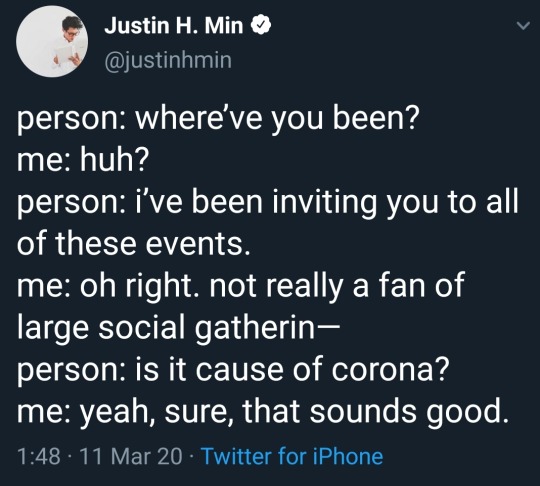
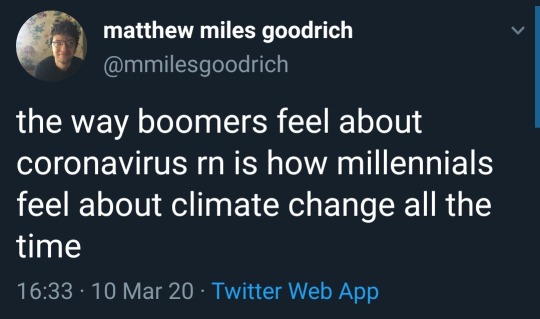
A lovely little collection of covid-19 takes
Also a little bonus:
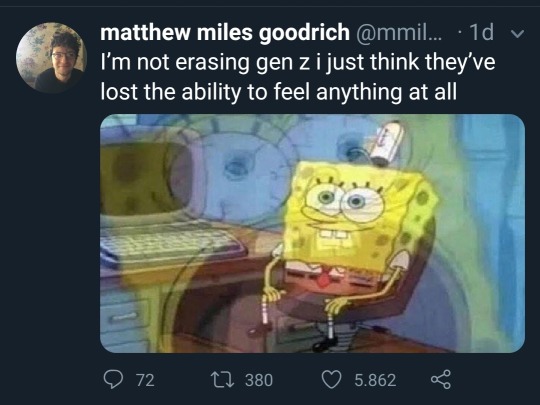
8K notes
·
View notes
Text
We’d be great parents
I feel like gen z would end up being great parents. Most of my friends don’t want kids but the few that do are like “ok so you’ll come over during Christmas or whatever and just spoil the shit out of my kids”. I feel that those that will have kids will have so much support from their friends because the past couple of generations have fucked us up so much they we’ll know what to do right. We’ll just be a giant family of friends known as “uncle/aunt ____” even if we aren’t actually related.
2K notes
·
View notes
Photo


US Helplines:
Depression Hotline: 1-630-482-9696
Suicide Hotline: 1-800-784-8433
LifeLine: 1-800-273-8255
Trevor Project: 1-866-488-7386
Sexuality Support: 1-800-246-7743
Eating Disorders Hotline: 1-847-831-3438
Rape and Sexual Assault: 1-800-656-4673
Grief Support: 1-650-321-5272
Runaway: 1-800-843-5200, 1-800-843-5678, 1-800-621-4000
Exhale: After Abortion Hotline/Pro-Voice: 1-866-4394253
Child Abuse: 1-800-422-4453
UK Helplines:
Samaritans (for any problem): 08457909090 e-mail [email protected]
Childline (for anyone under 18 with any problem): 08001111
Mind infoline (mental health information): 0300 123 3393 e-mail: [email protected]
Mind legal advice (for people who need mental-health related legal advice): 0300 466 6463 [email protected]
b-eat eating disorder support: 0845 634 14 14 (only open Mon-Fri 10.30am-8.30pm and Saturday 1pm-4.30pm) e-mail: [email protected]
b-eat youthline (for under 25’s with eating disorders): 08456347650 (open Mon-Fri 4.30pm - 8.30pm, Saturday 1pm-4.30pm)
Cruse Bereavement Care: 08444779400 e-mail: [email protected]
Frank (information and advice on drugs): 0800776600
Drinkline: 0800 9178282
Rape Crisis England & Wales: 0808 802 9999 1(open 2 - 2.30pm 7 - 9.30pm) e-mail [email protected]
Rape Crisis Scotland: 08088 01 03 02 every day, 6pm to midnight
India Self Harm Hotline: 00 08001006614
India Suicide Helpline: 022-27546669
Kids Help Phone (Canada): 1-800-668-6868
FREE 24/7 suicide hotlines:
Argentina: 54-0223-493-0430
Australia: 13-11-14
Austria: 01-713-3374
Barbados: 429-9999
Belgium: 106
Botswana: 391-1270
Brazil: 21-233-9191
China: 852-2382-0000
(Hong Kong: 2389-2222)
Costa Rica: 606-253-5439
Croatia: 01-4833-888
Cyprus: 357-77-77-72-67
Czech Republic: 222-580-697, 476-701-908
Denmark: 70-201-201
Egypt: 762-1602
Estonia: 6-558-088
Finland: 040-5032199
France: 01-45-39-4000
Germany: 0800-181-0721
Greece: 1018
Guatemala: 502-234-1239
Holland: 0900-0767
Honduras: 504-237-3623
Hungary: 06-80-820-111
Iceland: 44-0-8457-90-90-90
Israel: 09-8892333
Italy: 06-705-4444
Japan: 3-5286-9090
Latvia: 6722-2922, 2772-2292
Malaysia: 03-756-8144
(Singapore: 1-800-221-4444)
Mexico: 525-510-2550
Netherlands: 0900-0767
New Zealand: 4-473-9739
New Guinea: 675-326-0011
Nicaragua: 505-268-6171
Norway: 47-815-33-300
Philippines: 02-896-9191
Poland: 52-70-000
Portugal: 239-72-10-10
Russia: 8-20-222-82-10
Spain: 91-459-00-50
South Africa: 0861-322-322
South Korea: 2-715-8600
Sweden: 031-711-2400
Switzerland: 143
Taiwan: 0800-788-995
Thailand: 02-249-9977
Trinidad and Tobago: 868-645-2800
Ukraine: 0487-327715
(Source)
1M notes
·
View notes
Photo

all jokes aside this episode had a really good message
1K notes
·
View notes
Text
mental torture, thy name is chemistry
tfw chemistry is just starting to make sense to you less than 2 weeks before the ap exam. 🙄
7 notes
·
View notes
